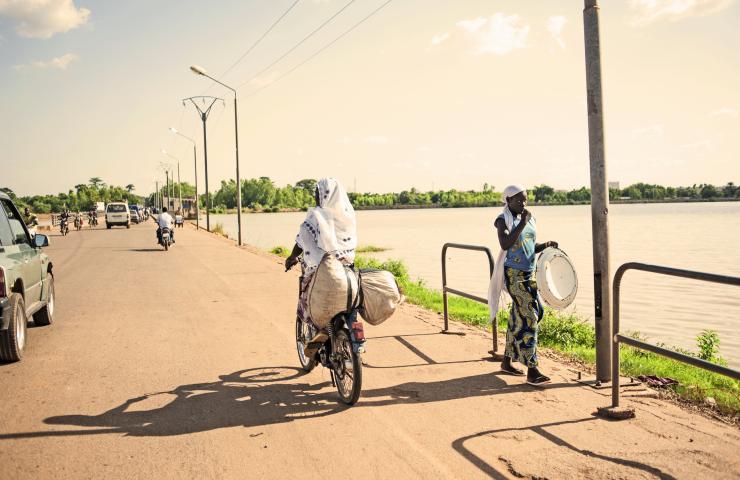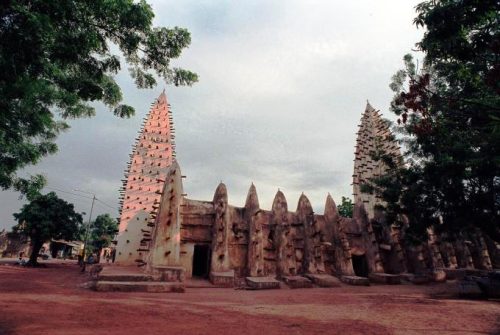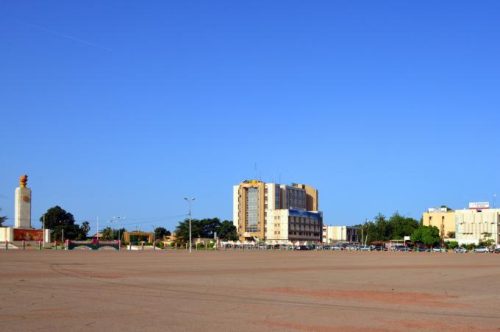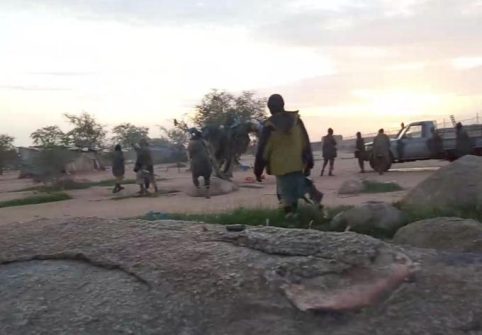Where to go…

Distrust seems to be growing not only among ethnic groups but also among religious communities. And this translates into attacks against the faithful gathered to pray in churches or mosques. And the junta bears its share of responsibility in all this.
To stay in power, Traoré, in addition to the measures seen above, frequently resorts to calls for the mobilisation of the population against Burkina Faso’s alleged internal and external enemies. A group of supporters of the president (called ‘Wayiyan‘) has been created in the population, who frequently demonstrate in the streets to support him.
Moreover, he seems to lean towards certain sectors of the Burkinabé Muslim community, and in particular towards Wahabi currents. He is the son of practising Muslims but is not practising on a personal level.

Mosque in the rural area. The Muslim community, the majority in Burkina Faso, had long felt excluded from the positions of power. File swm
On the contrary, according to some, he was initiated into traditional religion. Apart from these aspects, the Muslim community, the majority in Burkina Faso, had long felt excluded from the positions of power occupied by the Christian minority. Traoré’s rise to power and experienced by some as a redemption for this community. The problem is that this rebalancing would take place not in a democratic framework, but based on prevarication and force.
So, there is a risk of aggravating religious tensions, which have already been exacerbated by the actions of the jihadists.
The dynamics described above seem to be leading to a progressive disintegration of Burkina Faso, with a loss of territory to extremist groups and with a tearing apart of the social fabric and the breaking of the rules of coexistence between ethnic communities and between religions. To this must be added the abuses against critics of the regime, with the possibility of the loss of legitimacy of the institutions in the eyes of a large part of the citizenry.

Ouagadougou. A quiet moment, with nobody in the vast Place de la Revolution / Revolution square. iStock/ mtcurado
The measures put in place by the junta do not currently seem sufficient to guarantee its long-term survival. Despite cooperation with the Russians and other allies, the Burkinabé security forces are currently unable to defeat the subversive groups due to manpower and equipment shortages. The divisions within the armed forces between officers who benefited from the coup led by Traoré and their comrades sidelined could further slowdown the fight against subversive movements. The VDP also suffer from workforce and equipment shortages and complain of a lack of trust in them by the military.
Russia declared in 2023 that engagement in Africa is a strategic factor for it and therefore it is difficult to imagine that Moscow will withdraw from the region, at least in the short term. However, due to the conflict in Ukraine and the resulting international isolation (even if only partial), it is unable to deploy resources at least economically comparable to those that France and Western countries as a whole could deploy. These, however, are reluctant to intervene in support of Traoré and his clique because they are held back by aspects such as human rights violations against opponents and minorities (such as the Fulanis) and, in general, by distrust for a regime that is critical of the West because it is inspired by Pan-African rhetoric.
Some leaders of the countries in the region seem to be observing the evolving situation in Burkina Faso with concern. First of all because, as seen before, some of their armed forces officers might be tempted to take up arms like Traoré and then go to other military juntas and Russia for help. Secondly, because a possible final collapse of Burkinabé institutions would in any case have negative consequences for the security of the region. Jihadist groups, which the armed forces in Ouagadougou are currently trying to counter as best they can, would have even more freedom to manoeuvre. On the other hand, the crisis in Burkina Faso is also the child of the crisis in Mali, which in turn is also the child of the collapse of Gaddafi’s Libya.

Militant Jihadists in a village. CC BY-SA 4.0/ aharan_kotogo
The experience of Burkina Faso, Mali and Niger shows that military coups are not an effective solution to the problem of countering insecurity, particularly about the fight against jihadism. This problem requires a multidimensional effort on the economic, social and security levels that only articulated political management can provide. In other words, the military is only one tool among others in the fight against this phenomenon. Moreover, the remedy cannot be worse than the evil. Indeed, the damage done to the social structure of Burkina Faso in terms of increasing ethnic and religious tensions and the abuses against critics and opponents of the regime are likely to far outweigh any positive effects of the military dictatorship.
The very real risk is that the final bill will be paid by Burkinabe citizens, including those who support Traoré and his junta at the moment. (Open Photo: Ouagadougou. Woman riding her bicycle in the rush traffic of the Capital city. iStock/ U.Ozel.Images)
Andrea Carbonari



